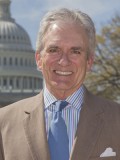 By Executive Director J. Brent Walker
By Executive Director J. Brent Walker
When the U.S. Supreme Court agreed to hear the same-sex marriage cases, the justices did not invite briefs on religious liberty. In its writ of certiorari granting review, the Court framed the issues to be whether same-sex marriage is constitutionally required under the Fourteenth Amendment and, if not, whether states under Article IV have to recognize same-sex marriages performed in states where it is legal. It did not frame any First Amendment issues.
But, clearly, church-state relations pervade this subject, and several justices turned to the topic in their questions to counsel and in their debate with each other on the bench.
Three such areas of inquiry about religious liberty are noteworthy:
First, Justice Antonin Scalia asked the petitioners’ attorney, Mary Bonauto, whether ministers and the churches they serve would have to perform and host same-sex weddings if they disagreed with that understanding of marriage. The answer from the attorneys, including Bonauto, and Justice Elena Kagan who chimed in, was an unequivocal “no.”
The day before the arguments, the BJC’s Holly Hollman wrote that she was “unaware of any credible public voice seeking marriage equality who is trying to force objecting clergy or houses of worship to perform or host a same-sex marriage ceremony.” I completely agree. Justice Scalia must not have gotten the memo.
Actually, Justice Scalia knows better; I think, as he often does, he was playing devil’s advocate (no pun intended). Under the First Amendment’s church autonomy doctrine, these decisions on the part of ministers and houses of worship are beyond the ken of government to second-guess or regulate.
Second, Chief Justice John Roberts inquired of Solicitor General Donald Verrilli whether, for example, religiously affiliated schools would have to provide housing for same-sex couples.
Verrilli responded that the balance between accommodating religious rights and ensuring civil rights — beyond the local church context — is something that will have to be worked out, probably at the state level. In my view, this would be the case with respect to most non-profit religious affiliates — such as colleges, retreat centers, adoption agencies and the like — and also for-profit wedding vendors providing goods and services who argue they are being required, in some fashion, to participate in the objectionable wedding ceremony.
Third, Justice Samuel Alito asked Verrilli whether a religiously affiliated college or university that objects to same-sex marriages could have its tax exemption threatened under a case called Bob Jones University v. United States (1983). In that case, the Supreme Court upheld the government’s revocation of Bob Jones University’s tax exemption because it banned interracial dating on campus and condemned interracial marriages. The Supreme Court reasoned that “[g]overnment has a fundamental, overriding interest in eradicating racial discrimination in education — discrimination that prevailed, with official approval, for the first 165 years of this Nation’s constitutional history.” (Full disclosure: the BJC filed an amicus brief that, while disclaiming any agreement with Bob Jones’ racist policies, supported Bob Jones in its opposition to the government’s withdrawal of a generally available benefit like tax exemption because the government disagrees with the taxpayer’s religious beliefs and practices.)
Verrilli acknowledged this would be an issue that will have to be dealt with. The solicitor general is right. But one thing is for certain: the Bob Jones decision should not threaten the tax-exempt status of houses of worship and other pervasively sectarian organizations. The Supreme Court was meticulously careful in Bob Jones to limit its decision to “religious schools — not … churches or other purely religious institutions; here the governmental interest is in denying public support to racial discrimination in education.”
The extent to which Bob Jones might apply to sexual orientation instead of race and to other religious affiliates besides education institutions is an issue yet to be resolved. But the tax-exempt status of churches should not be in jeopardy.
The takeaway from the religious liberty discussion before the Court is that many issues remain open and undecided, at least until after the Court rules on the underlying issue of same-sex marriage. Of course, the Court may give guidance on the religious liberty issues in the opinion when it comes down. One thing that is settled is the inviolability of the worship sanctuary and fundamental beliefs and practices in the life of the church. The BJC is poised to continue fighting for that protection.
From the May 2015 Report from the Capital. Click here to read the next article.
Click here to view the entire magazine as a PDF document.





